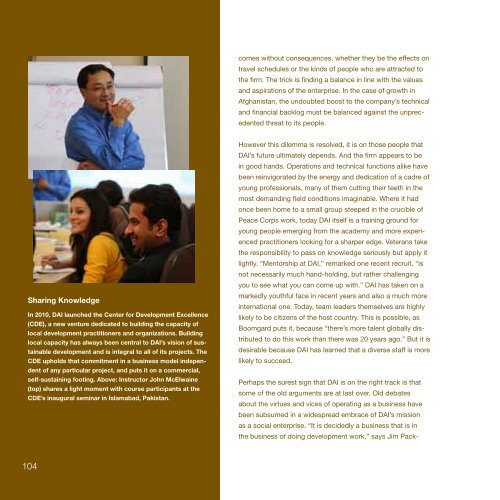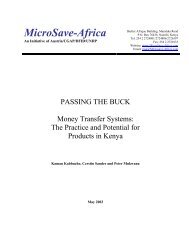You also want an ePaper? Increase the reach of your titles
YUMPU automatically turns print PDFs into web optimized ePapers that Google loves.
Sharing Knowledge<br />
In 2010, <strong>DAI</strong> launched the Center for Development Excellence<br />
(CDE), a new venture dedicated to building the capacity <strong>of</strong><br />
local development practitioners and organizations. Building<br />
local capacity has always been central to <strong>DAI</strong>’s vision <strong>of</strong> sustainable<br />
development and is integral to all <strong>of</strong> its projects. The<br />
CDE upholds that commitment in a business model independent<br />
<strong>of</strong> any particular project, and puts it on a commercial,<br />
self-sustaining footing. Above: Instructor John McElwaine<br />
(top) shares a light moment with course participants at the<br />
CDE’s inaugural seminar in Islamabad, Pakistan.<br />
104<br />
104<br />
comes without consequences, whether they be the effects on<br />
travel schedules or the kinds <strong>of</strong> people who are attracted to<br />
the firm. The trick is finding a balance in line with the values<br />
and aspirations <strong>of</strong> the enterprise. In the case <strong>of</strong> growth in<br />
Afghanistan, the undoubted boost to the company’s technical<br />
and financial backlog must be balanced against the unprecedented<br />
threat to its people.<br />
However this dilemma is resolved, it is on those people that<br />
<strong>DAI</strong>’s future ultimately depends. And the firm appears to be<br />
in good hands. Operations and technical functions alike have<br />
been reinvigorated by the energy and dedication <strong>of</strong> a cadre <strong>of</strong><br />
young pr<strong>of</strong>essionals, many <strong>of</strong> them cutting their teeth in the<br />
most demanding field conditions imaginable. Where it had<br />
once been home to a small group steeped in the crucible <strong>of</strong><br />
Peace Corps work, today <strong>DAI</strong> itself is a training ground for<br />
young people emerging from the academy and more experienced<br />
practitioners looking for a sharper edge. Veterans take<br />
the responsibility to pass on knowledge seriously but apply it<br />
lightly. “Mentorship at <strong>DAI</strong>,” remarked one recent recruit, “is<br />
not necessarily much hand-holding, but rather challenging<br />
you to see what you can come up with.” <strong>DAI</strong> has taken on a<br />
markedly youthful face in recent <strong>years</strong> and also a much more<br />
international one. Today, team leaders themselves are highly<br />
likely to be citizens <strong>of</strong> the host country. This is possible, as<br />
Boomgard puts it, because “there’s more talent globally distributed<br />
to do this work than there was 20 <strong>years</strong> ago.” But it is<br />
desirable because <strong>DAI</strong> has learned that a diverse staff is more<br />
likely to succeed.<br />
Perhaps the surest sign that <strong>DAI</strong> is on the right track is that<br />
some <strong>of</strong> the old arguments are at last over. Old debates<br />
about the virtues and vices <strong>of</strong> operating as a business have<br />
been subsumed in a widespread embrace <strong>of</strong> <strong>DAI</strong>’s mission<br />
as a social enterprise. “It is decidedly a business that is in<br />
the business <strong>of</strong> doing development work,” says Jim Pack-



